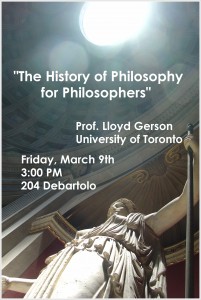Prof. Catherine Zuckert will be giving a talk entitled “Political Philosophy and History” on September 7th, 10:30-11:30 AM in 119 O’Shaughnessy Hall. She will be discussing her most recent book as an illustration of what she considers the value of the history of philosophy, and how best to approach it.
We will be giving away several FREE copies of her award-winning book, Plato’s Philosophers: The Coherence of the Dialogues . (first come, first serve)
Mid-morning snacks will also be provided.
In order to facilitate discussion, Prof. Zuckert has recommended a couple of readings. If you would like electronic copies of the readings for this session, please email workshop.phil.hist@gmail.com; for hard copies, visit 715 Hesburgh Library. Don’t hesitate to join us even if you don’t have time to do the readings!
Prof. Zuckert is the Nancy Reeves Drew Professor of Political Science. Her list of publications is extensive, but perhaps most impressive is her recent work on the coherence of the Platonic dialogues. Plato’s Philosophers is nearly 900 pages and took 12 years to write. It received the R. Hawkins Award for the Best Scholarly Book Published in 2009, an award for “Excellence in Humanities, the Best Book Published in Philosophy, and Outstanding Academic Title, Choice, 2009.
